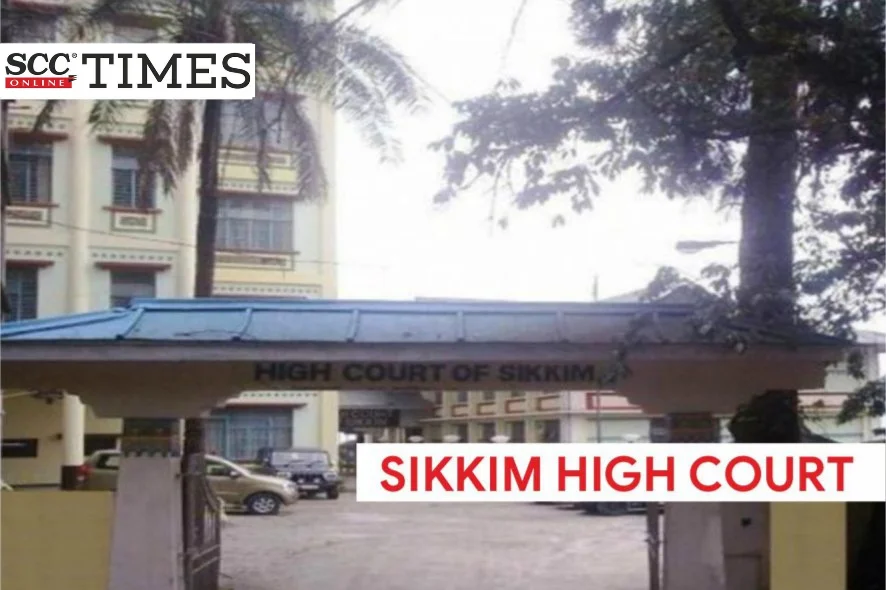Sikkim High Court: In a civil writ petition seeking pension and challenging the order passed by the Secretary to the Government of Sikkim, whereby the earlier order reducing the petitioner’s punishment from dismissal from service to compulsory retirement with compulsory retirement benefits was revoked, the Single Judge Bench of Bhaskar Raj Pradhan, J. explored the jurisdiction and scope of Rule 11 of the Sikkim Government Servants’ (Discipline and Appeal) Rules, 1985 (the Discipline & Appeal Rules). The Bench allowed the petition holding that the impugned order was passed in the teeth of Rule 11 of the Discipline and Appeal Rules, hence, liable to be set aside. The order modifying the penalty from dismissal from service to compulsory retirement was revived. The respondents were directed to comply with it within the period of three months and grant the petitioner the compulsory retirement pension in accordance with the Sikkim (Pension) Rules, 1990.
Background
A penalty of dismissal from service was imposed on the petitioner in terms of Rule 3(ix) of the Discipline & Appeal Rules. The petitioner filed a petition challenging the failure of the respondents to accept his notice for voluntary retirement or resignation. However, the petition came to be withdrawn as the State respondent stated that the Disciplinary Authority had taken its decision and imposed a penalty of dismissal of service on the petitioner. The petitioner made a representation to the Chief Minister to review the order of dismissal, seeking voluntary retirement. The order imposing the penalty of dismissal of service was modified and reduced it to compulsory retirement with compulsory retirement pension benefit in accordance with the Sikkim (Pension) Rules, 1990. Hence, the petitioner sought disbursement of retirement benefits as he was not given any retirement benefits.
The petitioner preferred the present writ petition before this Court for release of payment of compulsory retirement pension and other retirement benefits. During the pendency of the same, the impugned office order was passed, whereby the penalty was restored.
Analysis and Decision
Examining the power of Revision under Rule 10 and the power of Review under Rule 11 of the Discipline and Appeal Rules, the Court noted that it provides that- Governor may at any time, either on his own motion or otherwise, call for the records of any inquiry or revise any order made under these rules or under the rules repealed by rule 12 from which an appeal is allowed but from which no appeal has been preferred or from which no appeal is allowed, after consultation with the Commission where such consultation is necessary.
The Court noted that the Governor’s order in exercise of the powers conferred on him under Rule 10, called for the records of inquiry held against the petitioner, considered the quantum of punishment imposed and after due consideration came to the conclusion that the penalty of dismissal imposed was harsh and accordingly modified by reducing the penalty to compulsory retirement with an order that the petitioner be allowed compulsory retirement pension in accordance with the relevant provisions of the Sikkim (Pension) Rules, 1990. The Court said that Rule 10 permits the Governor to on his own motion call for the records of the inquiry or revise any order made after consultation with the Commission where such consultation is necessary. The Court stated that it allows the Governor to exercise his discretion to suo motu call for the records and consult the Commission whenever he deems it necessary. Hence, the Governor’s order passed in favour of the petitioner reducing his penalty cannot be assailed on the sole ground that the Commission was not consulted without anything more.
Further, the Court noted that Rule 11 permits the Governor to review any order passed “when any new material or evidence which could not be produced or was not available at the time of passing the order under review and which has the effect of changing the nature of the case, has come or has been brought to his notice”. However, in the matter at hand, the Court pointed out that no new material or evidence was placed by the respondent which has the effect of changing the nature of the case. The Court added that Governor’s failure to consult the Commission as envisaged in Rule 10 while passing the order modifying the penalty, alone would not change the nature of the case. The Court also noted that the proviso to Rule 11 prohibits any order imposing or enhancing any penalty by the Governor and mandates the requirement of fair play and natural justice by requiring a reasonable opportunity of making a representation against the penalty imposed. The Court also said that no such opportunity was granted before the impugned order was passed, by which the order modifying the penalty was withdrawn. When an order of compulsory retirement with compulsory retirement benefit was passed in favour of the petitioner, the impugned order dated imposing the penalty of dismissal of service without hearing the petitioner, cannot sustain.
[Mani Kumar Subba v. State of Sikkim, 2024 SCC OnLine Sikk 126, decided on: 11-12-2024]
Judgment Authored by: Justice Bhaskar Raj Pradhan






